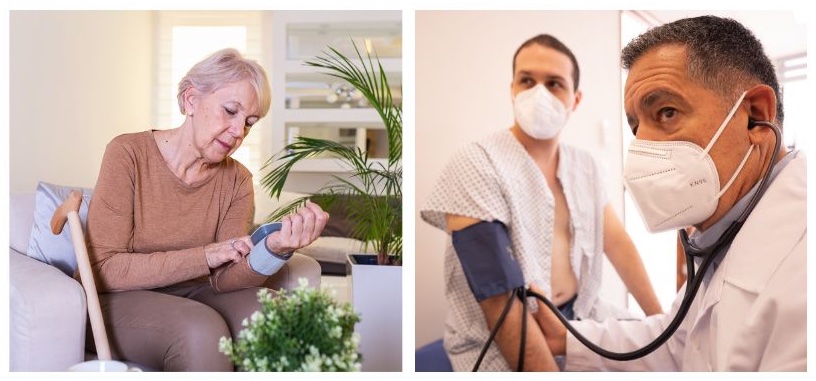


By now, your practice or healthcare facility is probably aware of remote patient monitoring (RPM). Once an emerging technology, RPM has become an essential tool for successful clinicians. Its necessity is poised to grow as an increasing number of physicians become aware of its utility, especially regarding patients with hypertension and heart failure (HF). But do you know how it can supplement and, sometimes, substitute in-clinic care to benefit your patients, support staff workflow, and maximize reimbursements?
Around 116 million people in the US have hypertension, and 6.2 million suffer from HF, according to the Centers for Disease Control and Prevention (CDC). Hypertension and HF are linked to high expenses, disability, and mortality rates. Unfortunately, both conditions pose challenges to patients and their doctors as they are difficult to manage without consistent monitoring.
Approximately 75% of hypertensive individuals do not have their condition controlled, putting them at a much-increased risk of heart disease or stroke. Nearly 517,000 deaths were attributed to high blood pressure in 2019 alone, and the US healthcare system spends more than $130 billion yearly on its treatment.
HF patients also have difficulty managing their condition, which usually requires lifestyle changes and medication compliance. In 2020, the CDC estimated that HF cost the US $43.6 billion. This total includes the cost of medical services, including hospitalizations, prescription drugs, and premature death.
Statistics are promising in terms of using RPM for hypertension and HF. A new study from the American Heart Association offers more insight as to how RPM is on par with in person clinical care in controlling hypertension.[1] Hypertensive patients whose blood pressure was monitored virtually had similar success in lowering both systolic and diastolic measurements as patients who had in-person visits with a clinician. The same study indicated that patient satisfaction among those receiving virtual care was higher than those receiving in-clinic care due to the ease of use of the RPM equipment and the ability to manage their condition from the comfort of their homes.
For patients with HF, the benefits of RPM are also overwhelmingly positive. Established research has proven that RPM reduces the frequency of hospitalizations, prevents unnecessary emergency room visits, and decreases 30-day readmission rates in HF patients reducing the need for frequent encounters with healthcare facilities.
When choosing an RPM provider, there are many factors to consider. The goal of initiating an RPM platform at your practice should be threefold and offer the following:
While many companies license RPM software solutions, they often leave its management to physicians and practice staff. These companies offload numerous status reports that can leave your practice drowning in paperwork, taking precious time away from monitored and in-person patients who urgently need your care. They may also leave your support staff questioning billing codes and procedures, which can lead to inaccurate reimbursements.
Cardiac RMS enables your practice to reach patient care, workflow, and financial goals by acting as an extension of your clinic. We do not simply license software; we offer a choice of robust, secure virtual care platforms and a range of patient-friendly cellularly-enabled monitoring devices. We employ a highly-trained staff of Patient Engagement Specialists who serve as a front line of care for your monitored patients. At the first sign of non-compliance or readings that are amiss, a team member will reach out by phone to your patient to offer support and education. This outreach creates a clinic-like experience at home which supports patient compliance and outcomes while driving patient satisfaction.
At Cardiac RMS, we pride ourselves on being a patient-centered company that is conscientious of your time and practice’s workload. Our specialists review and report findings in a concise, organized manner to help you work more efficiently, and we will only contact your office in the case of actionable data. Furthermore, our staff will provide up-to-date, accurate billing codes to ensure optimal reimbursement.
Connect with us to discover how Cardiac RMS RPM can improve patient outcomes and increase reimbursement income. We are prepared to collaborate with you to create a remote monitoring process suited to your practice’s and your patients’ needs.

Copyright © 2024 Cardiac RMS. All rights reserved.
Visually impaired? Contact us at 844-GET-CRMS for assistance.
Cardiac RMS LLC is a clinical service partner with expertise in remote monitoring of patients who have a cardiac pacemaker, implantable cardiac defibrillator, implantable heart failure device, or implantable loop recorder. Services also include Virtual Care Management, utilizing Remote Physiologic Monitoring (RPM) and care management to remotely support the treatment of patients with chronic conditions.